IRC Ghana, at both the national and district level, is helping partners to raise awareness that strong water and sanitation systems and appropriate hygiene behaviours are critical in the fight against the pandemic.
Published on: 12/05/2020
Ghana recorded its first confirmed case of COVID-19 on March 12, 2020 and as at May 10, 2020 4,700 cases have been recorded with 22 deaths and 494 recoveries. In the light of the pandemic, the Government of Ghana led by the President H.E Nana Addo Dankwa Akufo Addo, announced a series of measures and continues to review and provide updates to Ghana’s enhanced response to the coronavirus pandemic. These measures are geared towards combating the pandemic:
In response to the National COVID-19 measures some ministries, departments and agencies, as well as the Metropolitan, Municipal and District Assemblies (MMDAs) developed and are implementing COVID-19 emergency response action plans. Government leadership in this trying time and the response of partners like the Ministry of Sanitation and Water Resources (MSWR), Ministry of Health (MoH)/ Ghana Health Service (GHS), Community Water and Sanitation Agency (CWSA) and the Asutifi North District Assembly (ANDA) to the national COVID-19 measures is commendable.
As partners who have worked severally towards bringing safe and reliable drinking water to the rural poor in Ghana, it is the collective responsibility of all to adjust, align and support the current efforts. IRC Ghana, in this direction, is supporting the National COVID-19 response at both the national and district levels, working closely with partners and the Government - MSWR, CWSA, MoH / GHS and the ANDA, to step up awareness that strong water and sanitation systems, and appropriate hygiene behaviours are critical in the fight against the pandemic.
IRC has provided financial resources to support the implementation of the COVID response plans of the MSWR, CWSA, GHS and the ANDA. The support to the MSWR is for the monitoring and coordination of WASH related COVID-19 interventions; and the CWSA for community outreach on handwashing with soap and water. The collaboration with MoH/GHS (Institutional Care Division) is to support the COVID-19 Risk Assessment of selected healthcare facilities with reported cases to mitigate the rate of infections.
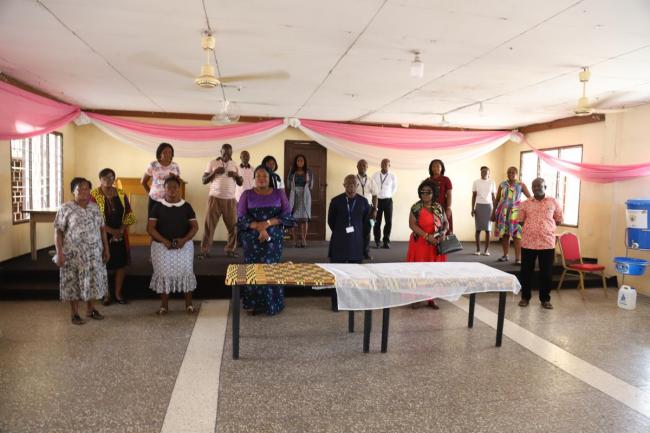
At the district level, the financial resources to the ANDA is for the training of health workers, district staff, counter medicine sellers and CSOs about the virus; and to undertake detailed assessment of district COVID response needs, which is central to tackling the public health emergency and the long-term development of resilient systems.
Additionally, IRC Ghana has in collaboration with the Resource Centre Network and Netcentric Campaign deployed all channels to support the WASH/ COVID-19 dialogue; and to amplify relevant messages to key audiences and beneficiaries at the national and district levels.
IRC Ghana believes this is the time to act decisively and collectively to promote the value of water, sanitation and hygiene to the health and security of everyone everywhere in Ghana - leaving no one behind.
The CWSA, a public institution responsible for providing safe water, water related sanitation and hygiene services to rural communities and small towns in Ghana, set up a team, which developed a COVID-19 emergency response strategy and guidelines to reach out to rural communities.
Worlanyo Kwadjo Siabi, Chief Executive of CWSA stated: “The focus of our strategy is the promotion of effective handwashing with soap, application of alcohol-based sanitisers and deployment of handwashing logistics through our regional and water system offices. Our offices will engage communities through local radio stations and community information centres, to provide the right information on proper handwashing with soap and how to avoid contracting the coronavirus disease. Communities will also be supported to construct simple local handwashing facilities especially at the household level, such as tippy taps.”
Mr. Siabi added that the agency will also contribute towards the provision of handwashing facilities, soap and hand sanitisers to community clinics and Community-Based Health Planning and Services (CHPS) compounds. He further stated, “Our Community Relations Officers will mount intensive public education in rural communities on proper handwashing and prevention of COVID-19. CWSA will ensure that water is available to facilitate proper handwashing with soap under running water in rural communities and small towns.”
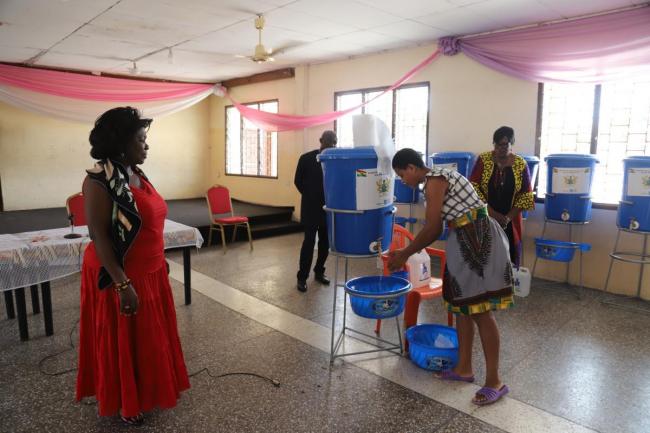
As part of the strategy implementation process, the Agency in collaboration with the Ministry of Sanitation and Water Resources donated handwashing facilities to Osu Children’s home in Accra. The Agency is also working with the Ministry of Local Government and Rural Development through the Public Health Emergency Committees to help communities across the country.
IRC Ghana, in addition to the funding support, is working with CWSA in engaging stakeholders and amplifying key evidence-based educational messages, including short videos on handwashing through the WASH resource centre network channels, CSO partner networks, the Sanitation Challenge WhatsApp platform and the ANAM district level platforms.
IRC Ghana also provided support to produce a short handwashing video for the National Development Planning Commission’s hygiene awareness campaign in response to the COVID-19 pandemic. This was part of a round of documentation of WASH success stories commissioned by the NDPC. The documentation is about handwashing facilities developed by World Vision in schools in the Asutifi North District and captured by IRC Ghana in March 2020.
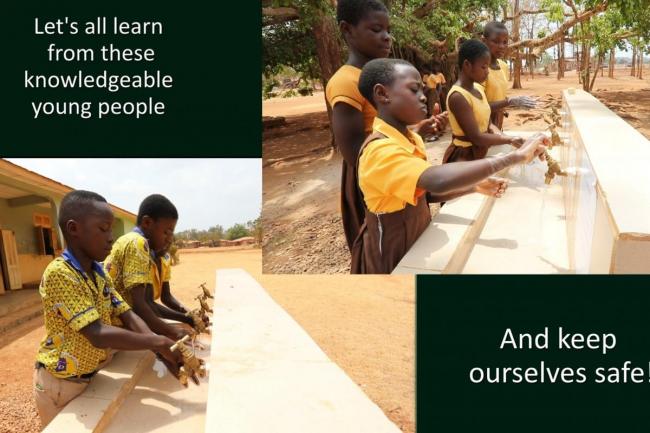
Collective efforts for Asutifi North District COVID-19 response
The Asutifi North District has been implementing several measures in response to the National COVID-19 strategy - including the ban on meetings and workshops and the call on citizens to observe social distancing and hand hygiene protocols. These measures have slowed economic activity, affected businesses and the implementation of the ANAM project activities.
Though the district is yet to report its first confirmed case, the impact of COVID-19 is already being felt by the citizens either directly or indirectly ranging from people in the formal sector to the informal sector whose businesses and incomes have been severely affected.
In response to the pandemic at the district level, the Asutifi North District Assembly has prepared and operationalised an Epidemic Preparedness and Response plan. The objectives of the plan are to:
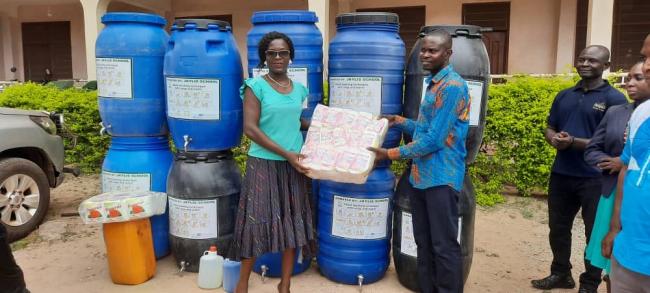
To operationalise the plan, a Public Health Emergency Committee has been established to oversee the implementation of the plan which is in line with the national COVID strategy. Under the guidance of the Committee, several measures including public awareness campaigns have been launched to sensitise the public on the pandemic. An emergency phone number has also been set up to enable citizens to call in to report any suspected case for immediate action.
To ensure compliance with the President’s directives on social distancing and provision of handwashing facilities in markets to prevent the spread of COVID-19, the District Assembly has met and agreed with the market queens to divide the market into segments to reduce congestion and provide handwashing facilities.
The Conrad Hilton Foundation (CNHF) Grantees working in the district to support the implementation of the ANAM WASH master plan are collaborating with the District Assembly in various ways to implement the District COVID response plan.
IRC Ghana has provided financial resources to the Asutifi North District Assembly to roll out public awareness creation amongst the citizenry about the virus through information vans and community information centres. This support also enabled the Assembly to carry out training of trainers’ workshop for the district staff, health workers, counter medicine sellers and CSOs about the virus.
Furthermore, IRC Ghana in collaboration with Netcentric Campaigns and the District Assembly are creating public awareness on COVID-19 amongst the citizenry through radio and information centres, ANAM website, ANAM Facebook page, and production and distribution of leaflets to provide information.
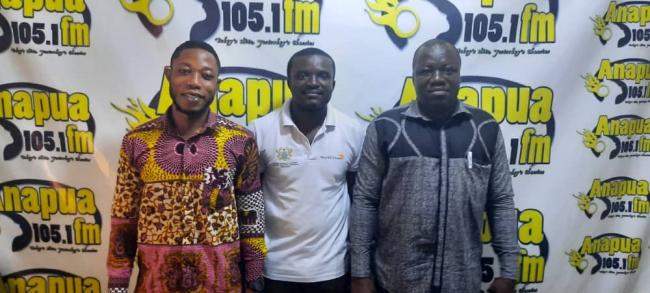
World Vision International, Ghana is providing Personal Protection Equipment (PPEs) for health care workers and handwashing facilities for institutions and public places in the district.
Safe Water Network (SWN) has started providing free water for the people of Gambia and Wamahinso in compliance with government directive on three months free water for citizens to help prevent and contain the spread of the virus in the district. SWN will also identify and connect health care facilities within the operational areas of their water stations to ensure infection prevention and control. Additionally, information materials on COVID-19 will be disseminated at the standpipes, water stations, and water kiosks of Safe Water Network and Aquaya Institute.
Other private companies operating within the district including Newmont Gold Corp Ghana Limited and religious bodies have also provided hand hygiene facilities to the Asutifi North District Assembly for onward distribution to communities, public places and health facilities to help fight the virus. As part of the corporate social responsibility of the local media network, additional airtime (slots) for radio adverts and talk shows on COVID-19 has been offered to the District Assembly to create awareness and educate the citizenry.
It is possible some of the projections for WASH coverage under the ANAM initiative may be affected, depending on the course of the pandemic in Ghana. However, ANAM partners are committed to supporting the district COVID response, considering that an effective WASH system is a source of resilience for communities in the district. Indeed, the pandemic underscores the importance of WASH, especially proper hygiene practice as a vital protection for communities at all levels.